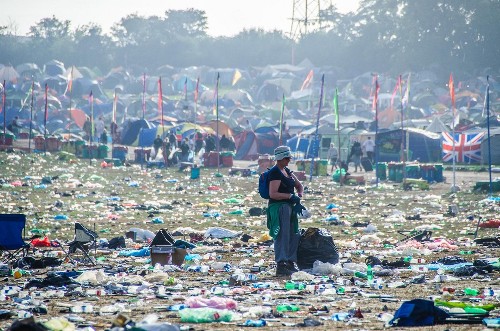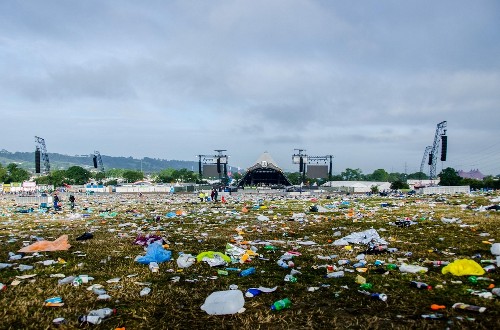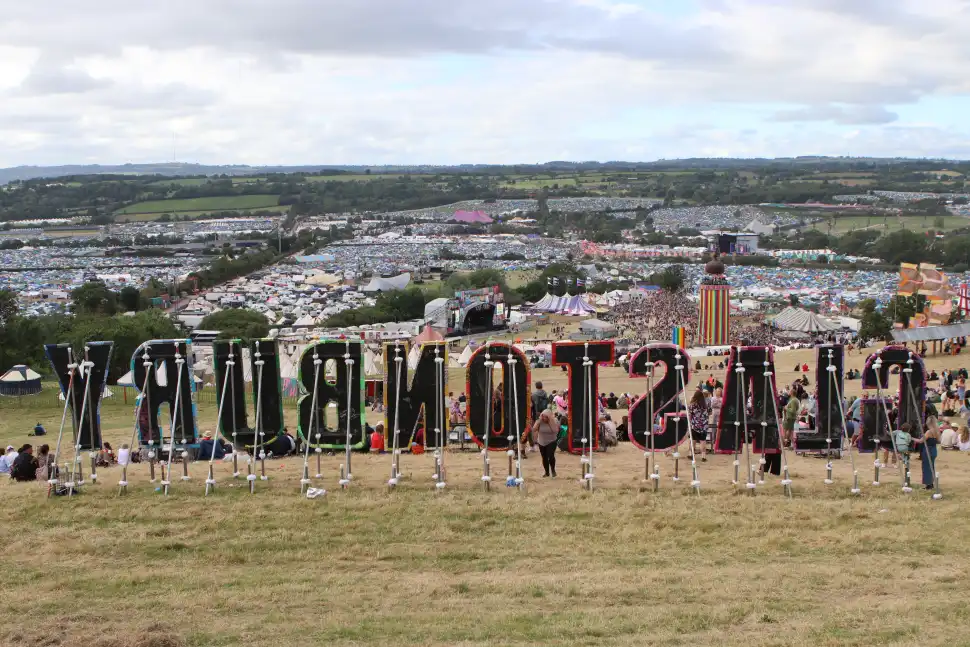
Glastonbury Festival 2016
Wednesday 22nd to Sunday 26th June 2016Worthy Farm, Pilton, Shepton Mallet, Somerset, BA4 4AZ, England MAP
£228 - SOLD OUT
Last year art photographer Andy Hughes was asked to support RawFoundation UK's Making Waves Plastic-Free Festival campaign at Glastonbury Festival.
For more than 20 years, he has been documenting the 'plastic problem' in works that he hopes will inspire people to try and live more sustainably. Alongside providing a series of images for RawFoundation UK's activities at the Festival, he documented a new, discreet photographic work—a type of personal witness statement.
Called 'Glastonbury Opus 1', Hughes plans to to exhibit and publish a new book of his work which explores the tension between the seductive depiction of object, colour and seemingly sculptural forms with an underlying narrative of environmental degradation. He plans to demonstrate that gatherings like festivals, where tens of thousands of people congregate and generate huge quantities of waste, raise questions about irresponsible behaviour and mass consumption.
Hughes explains, "I was a virgin Glastonbury Festival goer when I arrived one Friday afternoon in June, with wellies, toilet roll, two cameras, laptop, batteries and packs of dried noodles. I felt prepared. Over a period of three days, I wandered across the site with a sense of purpose, on the one hand to generate photographs for Raw, on the other to continue with my work about plastic and waste. I wanted to observe firsthand an event where huge numbers of people gather and consume packaged food and drink, ultimately generating monstrous amounts of waste.
"There was a broad range of people at the event, and it's not my intention to directly criticize a festival that many believe is held with the best intentions. As the largest greenfield festival in the world, with over 200,000 attendees in 2015, such a festival requires extensive infrastructure in terms of security, transport, water and electricity. Many of the staff are volunteers and the festival aims to raise millions of pounds for good causes.
"However, initially inspired by a counterculture and a kind of 'green activism', it was rather depressing to witness, at times, a kind of gorging. In a world where scarcity is the norm for many people, and poverty is an everyday state of being, I was disappointed to see the ease with which far too many people threw away stuff—plastic bottles, food, tents, chairs, clothes and all manner of personal and household consumer goods.
"In Glastonbury Opus 1, my work explores the tension between the seductive depiction of object, colour and seemingly sculptural forms with an underlying narrative of environmental degradation. Gatherings like this, where tens of thousands of people congregate and generate huge quantities of waste, raise questions about irresponsible behaviour and mass consumption.
"However, these photographs attempt not to simply use the rhetoric of documentary photography. In much of my previous work, didacticism only plays a small part; a larger part is the staging of a visual, poetic, plastic aesthetic. The photographs Opus1 combine the rhetoric of documentary photography and this visual poetic. "

The Glastonbury Festival makes a huge effort to deal responsibly with all the plastic waste people dump on the farmland, and present information to all festival goers about reducing waste. The Festival makes a huge effort to reduce and recycle all that plastic. There are 2,500 people in the cleaning team with 1,900 volunteers, 60 litter-picking teams working in 4/6-hour shifts, 24 hours around the clock. The amount of collected recycled material in each recycling bag was for the first time 100 percent.
The festival is committed to minimising the amount of waste, and managing the on site collection of that waste efficiently, they ask attendees to 'reduce, reuse and recycle'. All Festival goers are asked in planning what they take with them to think ‘zero waste’ and to take home what they bring onto the Festival site. Festivals goers should to think responsibly when they are packing their things to come to Glastonbury, don’t bring items that will end up in Landfill, or single use plastics, or items that you won’t be able to take back home again.
Clearly it's up to Festival goers themselves to try and not bring so much plastic to dump on site. Attendees need to try not to being disposable plastic with them, and choose items that are not packaged in plastic, and carry your own bags, containers and utensils.
The Festival ensures the food traders on site use durable, non-toxic utensils, that are recyclable. Whilst you should not choose glass (it's banned on site), consider paper, stainless steel, wood, ceramic and bamboo over plastic.
Festivals goers at any event this summer should make efforts to reduce their plastic footprint. Cut down on consumption of goods that contain excessive plastic packaging and parts. If it will leave behind plastic trash, don't buy it.
They ask you to recycle what you can’t refuse, reduce or reuse. Pay attention to the entire life cycle of items you bring into your life, from source to manufacturing to distribution to disposal.
There are many organizations and individuals all over the world, including artists, who are working to reduce the amount of synthetic plastic in the environment. They are raising awareness about the true extent of plastic pollution and its impact upon the globe.
As Glastonbury Festival states, as part of it's love the farm leave no trace policy, (here), Festival goers should plan to "Limit what you bring, and clean up behind you. The Festival commits to continuing its policy of reducing the percentage of waste that goes to landfill, by placing controls on what is bought on site by staff, contractors, sponsors and traders and by emphasis on their responsibility not to bring items that will end in landfill. All cans, glass, paper, wood and organic waste are separated and recycled. There are 15, 000 bins around the site clearly identified for either wet or dry recyclable materials or non-recyclable rubbish."
Click here, for more information on the Raw Foundation and to learn more about plastic pollution, and #Resolve2Refuse single-use plastic in the first place.
The Plastic Pollution Coalition is a global alliance of individuals, businesses and organizations working together to end plastic pollution and its toxic impacts on people, animals, the ocean, and the environment.
Latest Updates
 Neil Young Confirmed As Pyramid Headliner For Glastonbury 2025
Neil Young Confirmed As Pyramid Headliner For Glastonbury 2025After first pulling out due to apparent miscommunication
 Glastonbury Festival 2025
Glastonbury Festival 2025festival details
 Glastonbury Festival 2025
Glastonbury Festival 2025line-ups & rumours
 Glastonbury Festival
Glastonbury Festivalfestival home page
 Glastonbury Announces Ticket Sale Dates For 2025 Festival
Glastonbury Announces Ticket Sale Dates For 2025 FestivalTickets will go on sale mid-November, with small price increase





